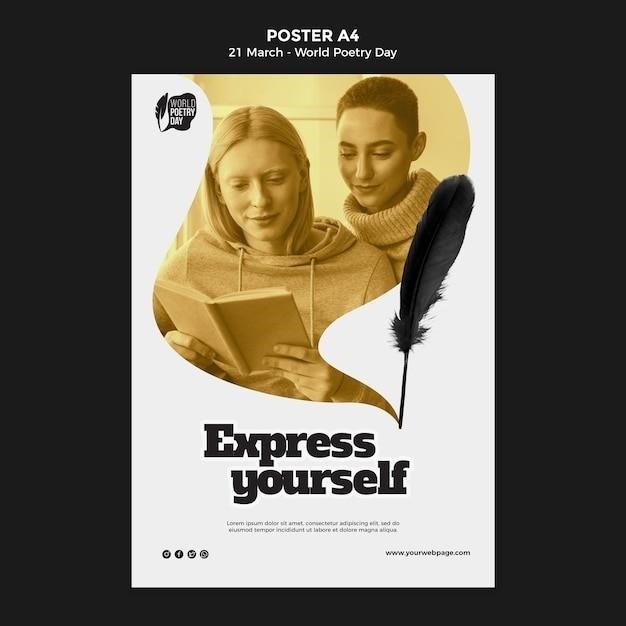I Am Malala⁚ An Overview
Malala Yousafzai’s autobiography‚ “I Am Malala‚” recounts her life‚ activism for girls’ education‚ and the Taliban’s attack. It details her experiences in Pakistan and her global advocacy for education and women’s rights. The book is available in various formats‚ including PDF.
Malala Yousafzai’s Life and Activism
Malala Yousafzai’s life story‚ vividly depicted in her autobiography “I Am Malala‚” begins in Mingora‚ Pakistan’s Swat Valley. Born into a Pashtun family‚ she was named after Malalai of Maiwand‚ an Afghan heroine. Her father‚ Ziauddin Yousafzai‚ a progressive educator‚ instilled in her a passion for education and a strong voice. Even as a young girl‚ Malala displayed remarkable courage‚ defying the Taliban’s restrictions on girls’ schooling. She actively challenged the oppressive regime‚ advocating for girls’ rights to education through various means‚ including blogging for the BBC Urdu. This activism eventually led to the tragic but globally impactful assassination attempt in 2012.
The Taliban’s Restrictions on Girls’ Education
A central theme in Malala Yousafzai’s “I Am Malala” is the Taliban’s brutal suppression of girls’ education in the Swat Valley. The Tehrik-e-Taliban Pakistan (TTP)‚ a militant Islamist group‚ imposed severe restrictions‚ banning girls from attending school. This action stemmed from their extremist interpretation of Islamic law‚ viewing female education as contrary to their beliefs. The Taliban’s actions created a climate of fear and intimidation‚ forcing many girls to abandon their studies. Malala’s powerful narrative highlights the devastating impact of this policy‚ illustrating how it deprived girls of their fundamental rights and future opportunities. The Taliban’s actions are presented as a stark violation of human rights and a significant obstacle to progress and development within the region.
Malala’s Advocacy and the Assassination Attempt
Malala Yousafzai’s unwavering advocacy for girls’ education began at a young age‚ even before the Taliban’s restrictions intensified. She bravely spoke out against their oppressive policies‚ using various platforms to share her views and experiences. This activism‚ combined with her blog for the BBC‚ brought her to the attention of a wider audience. However‚ her outspokenness made her a target for the Taliban. On October 9‚ 2012‚ while returning from school‚ Malala was shot in the head by a Taliban gunman. This assassination attempt‚ though horrific‚ catapulted her to international recognition‚ transforming her into a global symbol of resilience and the fight for education. The attack only strengthened her resolve‚ and she continued her fight for girls’ right to education.

The Autobiography⁚ I Am Malala
Malala Yousafzai’s powerful memoir‚ co-written with Christina Lamb‚ details her life‚ activism‚ and the Taliban’s attack. Published in 2013‚ it’s a testament to courage and the pursuit of education.
Publication Details and Editions
Malala Yousafzai’s autobiography‚ “I Am Malala⁚ The Girl Who Stood Up for Education and Was Shot by the Taliban‚” was initially published on October 8‚ 2013‚ in the United Kingdom by Weidenfeld & Nicolson and in the United States by Little‚ Brown and Company. The book quickly gained international recognition‚ leading to numerous translations and editions. Besides the original adult version‚ a young readers’ edition‚ adapted by Patricia McCormick‚ was also released to make Malala’s story accessible to a wider audience. Various ebook formats‚ including PDF versions‚ are available for purchase or download from authorized online retailers and libraries. The widespread availability ensures accessibility for readers across different platforms and preferences‚ reflecting the global reach of Malala’s message. The different editions cater to diverse age groups and reading preferences‚ ensuring the powerful message resonates effectively. These multiple formats highlight the significant cultural impact of Malala’s story. Finding a legitimate copy‚ whether print or digital‚ is essential to support Malala’s work and the continued fight for girls’ education.
Key Themes Explored in the Book
Central to “I Am Malala” is the unwavering importance of education‚ particularly for girls‚ within a society grappling with patriarchal norms and extremist ideologies. The narrative powerfully highlights the resilience of the human spirit in the face of adversity‚ showcasing Malala’s courage and determination to pursue knowledge despite immense threats. The book explores the complexities of cultural identity‚ particularly within Pashtun society‚ examining the interplay of tradition‚ religion‚ and the fight for fundamental human rights. Furthermore‚ it delves into the devastating impact of conflict and religious extremism on individuals and communities‚ underscoring the urgent need for peace and tolerance. The profound bond between Malala and her father‚ Ziauddin Yousafzai‚ and the crucial role he played in shaping her activism‚ is another significant theme. Finally‚ the narrative underscores the global significance of advocating for human rights and the power of a single voice to inspire widespread change.
Critical Reception and Impact
Upon its release‚ “I Am Malala” garnered significant critical acclaim‚ praised for its powerful storytelling‚ intimate portrayal of a young girl’s experiences‚ and its urgent message about the importance of education and human rights. Many reviewers lauded Malala’s bravery and eloquence‚ highlighting the book’s ability to connect with readers on an emotional level. The autobiography’s impact extended far beyond literary circles; it ignited global conversations about girls’ education‚ women’s rights‚ and the fight against extremism. The book contributed significantly to raising awareness of the challenges faced by girls in conflict zones and inspired numerous initiatives aimed at providing educational opportunities for marginalized communities. Malala’s powerful narrative further cemented her position as a leading global advocate for education and social justice. The book’s widespread success also translated into increased visibility for the Malala Fund‚ further amplifying its important work.

Malala’s Continued Advocacy
Following the publication of “I Am Malala‚” Yousafzai remains a prominent activist. She continues to champion girls’ education globally through speeches‚ appearances‚ and the Malala Fund.
The Malala Fund and its Work
The Malala Fund‚ established by Malala Yousafzai‚ is a non-profit organization dedicated to ensuring that every girl has the right to 12 years of free‚ safe‚ and quality education. The Fund works in various countries‚ supporting local education activists and organizations already working on the ground. Their approach focuses on providing grants to these organizations‚ amplifying their voices and creating global awareness. The Malala Fund also actively advocates for policy changes that promote girls’ access to education at local‚ national‚ and international levels. Their initiatives range from direct financial assistance to schools and communities to the development of educational resources and advocacy campaigns. The Fund’s ultimate goal is to create a world where all girls can go to school and fulfill their potential‚ a vision deeply rooted in Malala’s personal experiences and unwavering commitment to education.
Malala’s Speeches and Public Appearances
Malala Yousafzai is a powerful and compelling speaker‚ frequently addressing global audiences on issues of education‚ human rights‚ and gender equality. Her speeches are often deeply personal‚ drawing on her own experiences to illustrate the importance of education for girls and the devastating consequences of denying them this fundamental right. She has addressed the United Nations‚ world leaders‚ and various international forums‚ consistently advocating for policy changes and increased investment in girls’ education. Beyond formal speeches‚ Malala engages in numerous public appearances‚ including interviews‚ panel discussions‚ and meetings with activists and community leaders. These engagements allow her to connect with people from diverse backgrounds‚ sharing her story and inspiring others to join the fight for education. Her public presence has played a crucial role in raising awareness and mobilizing support for her cause.
Malala’s Education and Future Goals
Malala Yousafzai’s unwavering commitment to education is deeply personal‚ stemming from her own experiences and the challenges faced by girls in many parts of the world. Her education was interrupted by the Taliban’s restrictions in Swat Valley‚ Pakistan‚ highlighting the critical need for access to education for all. After surviving an assassination attempt‚ she continued her education‚ attending school in England. She later pursued higher education at the University of Oxford‚ earning a degree. Malala’s future goals extend beyond her own academic achievements; she aims to continue her advocacy work through the Malala Fund‚ ensuring that girls worldwide have the opportunity to receive quality education. Her dedication to education underscores her belief in its transformative power to empower individuals and communities. She envisions a future where every girl has the chance to fulfill her potential.
Accessing I Am Malala
While online PDFs may exist‚ obtaining “I Am Malala” legally is crucial. Purchase the book‚ borrow it from a library‚ or explore authorized ebook versions for ethical access.
Finding the PDF Online (Cautionary Note)
Numerous websites claim to offer free PDF downloads of “I Am Malala.” However‚ downloading copyrighted material without permission is illegal. These PDFs are often of questionable quality‚ may contain viruses or malware‚ and may not represent the complete or accurate text. The author and publishers deserve compensation for their work. Respecting intellectual property rights ensures continued creation and accessibility of quality literature. Consider the ethical implications before accessing unofficial copies. Legitimate options exist for reading “I Am Malala‚” such as purchasing the book or borrowing it from a library. These methods support the author and ensure you have a legal and safe copy of the book.
Legal and Ethical Considerations of Downloading
Downloading copyrighted material like “I Am Malala” without purchasing it is copyright infringement‚ a violation of intellectual property law. This can lead to legal consequences‚ including fines or lawsuits‚ especially for large-scale distribution. Beyond the legal aspects‚ consider the ethical implications. Downloading pirated PDFs deprives the author‚ Malala Yousafzai‚ and the publishers of rightfully earned income‚ impacting their ability to continue their work. This action also undermines the value of creative works and discourages future authors. Supporting creators through legitimate purchases or library loans helps sustain the publishing industry and ensures access to quality literature for everyone.
Alternative Access Methods (Libraries‚ Purchases)
Accessing “I Am Malala” ethically and legally offers several convenient options. Public libraries often stock the book‚ providing free borrowing privileges to their members. This allows you to read the autobiography without any cost while supporting the library system. Alternatively‚ purchasing the book directly from bookstores‚ online retailers like Amazon‚ or through the publisher ensures that Malala Yousafzai and those involved in the book’s production receive proper compensation for their work. E-book versions are also widely available‚ offering a digital reading experience. Choosing to purchase or borrow from a library shows respect for intellectual property rights and encourages continued production of important literary works.
I Am Malala⁚ A Legacy
Malala’s story continues to inspire global education reform and women’s rights movements. Her courage and advocacy for girls’ education leave a lasting impact on the world.
Malala’s Impact on Global Education
Malala Yousafzai’s autobiography‚ “I Am Malala‚” significantly impacted global discussions surrounding girls’ education. Her experiences‚ vividly depicted in the book‚ shed light on the challenges faced by girls in regions where education is restricted or denied due to conflict‚ cultural norms‚ or political oppression. The book’s widespread readership brought international attention to the importance of education as a fundamental human right and a crucial tool for empowerment‚ particularly for girls and women. Malala’s powerful narrative transcended geographical boundaries and resonated deeply with people worldwide‚ prompting renewed calls for increased investment in education‚ especially for girls in marginalized communities. The book served as a catalyst for numerous initiatives and campaigns advocating for better access to quality education‚ challenging existing inequalities and promoting gender equality in education systems globally. Malala’s unwavering commitment‚ as detailed in her autobiography‚ inspired countless individuals to fight for educational opportunities for all‚ fostering a global movement for educational justice and equality. The impact of “I Am Malala” continues to inspire change‚ shaping policies and practices aimed at ensuring that every girl has the right to an education.
Her Influence on Women’s Rights Movements
Malala Yousafzai’s “I Am Malala” profoundly impacted global women’s rights movements. The book’s raw honesty about her experiences living under Taliban rule‚ where girls were denied education and basic freedoms‚ resonated deeply‚ galvanizing support for women’s rights worldwide. Malala’s bravery in the face of adversity‚ her unwavering commitment to education‚ and her powerful voice became symbols of resistance against oppression and discrimination. The autobiography highlighted the interconnectedness of education‚ empowerment‚ and gender equality‚ inspiring activists and organizations to champion girls’ and women’s rights on a broader scale. Malala’s story served as a powerful reminder of the systemic barriers faced by women and girls globally‚ prompting renewed calls for legal reforms‚ social change‚ and increased advocacy for women’s rights. The book’s impact extended beyond raising awareness; it fueled activism‚ contributing to a renewed global commitment to gender equality and the fight for women’s rights in various contexts and cultures. Malala’s legacy continues to inspire generations of women and girls to demand their rights and fight for a more just and equitable world.
Enduring Significance of Her Story
Malala Yousafzai’s narrative transcends a personal memoir; it stands as a testament to the enduring power of human resilience and the transformative potential of education. “I Am Malala” continues to resonate because it encapsulates a universal struggle for freedom and the right to learn‚ irrespective of gender‚ ethnicity‚ or geographical location. The book’s impact lies not only in its detailed account of Malala’s experiences but also in its ability to evoke empathy and inspire action. It serves as a poignant reminder of the ongoing struggle for girls’ education and women’s rights in many parts of the world. Malala’s story‚ despite its specific context‚ possesses a timeless quality that speaks to fundamental human values. Its enduring relevance lies in its ability to continually inspire individuals and organizations to advocate for educational opportunities for all‚ regardless of background or circumstance. The book’s legacy extends beyond the immediate impact of its publication‚ continuing to shape conversations and actions related to education‚ human rights‚ and gender equality on a global scale. It is a powerful reminder that even in the face of extreme adversity‚ the human spirit can prevail‚ and the pursuit of knowledge can be a catalyst for profound social change.




